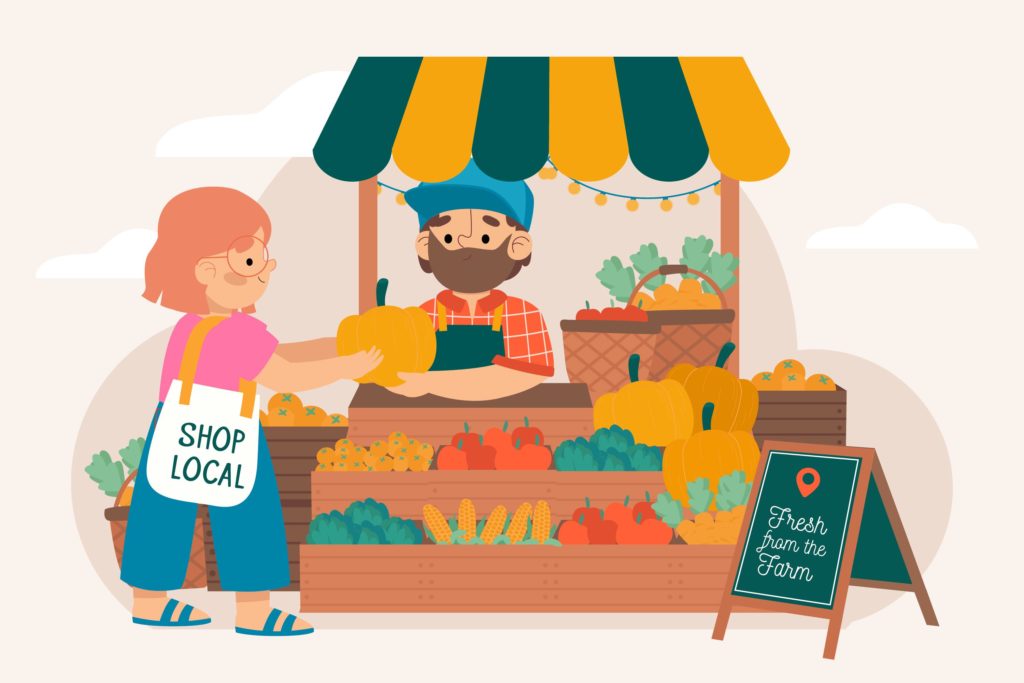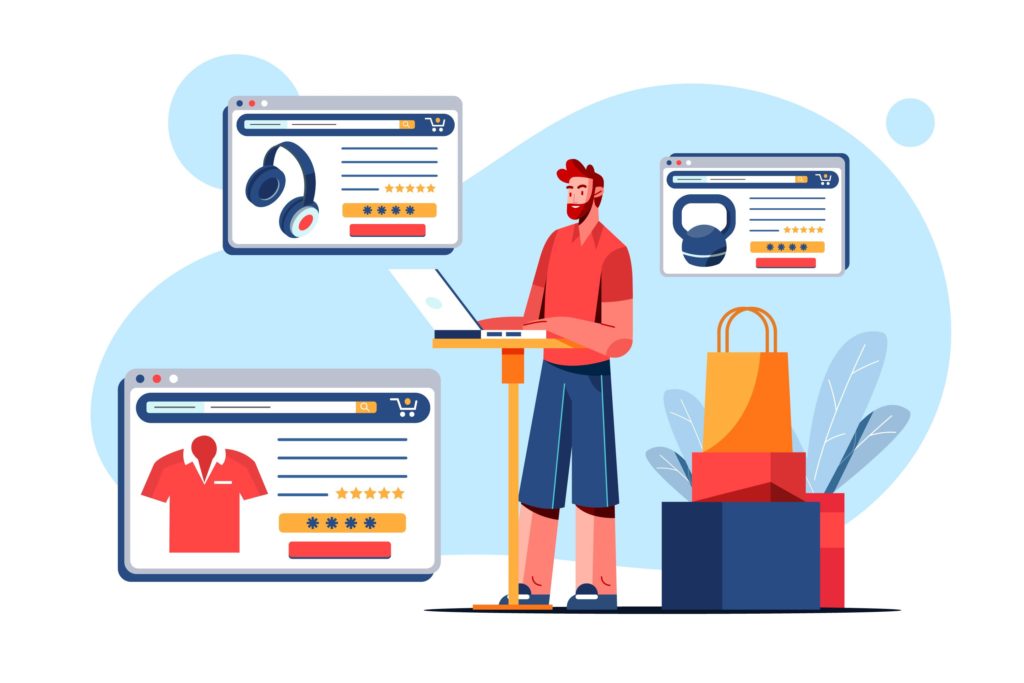
- Products
- Solutions
- Learn
- Partner
- Try Now
In an increasingly digital world, adaptability is required, if not for a competitive advantage, then for survival. Local Commerce is when you use your online store to sell just to people in your area 24 hours a day, seven days a week. Local merchants and shops are particularly interested in locating resources that can assist them in growing their business and profit. As a result, they recognize that their marketing and sales initiatives will generate leads and sales.

What is local commerce?
A customer orders a product from a seller, and the merchant delivers the goods to the customer from the nearest location. This significantly cuts the time and expense of logistics while also establishing a degree of confidence between the two parties. This is primarily due to the fact that the consumer is purchasing from a nearby, or local, merchant or shop.
Local commerce (also known as hyper-local commerce) is classified as Offline-to-Online commerce (O2O). The word “O2O” refers to the possibility (should be the reality) for retailers with physical stores to market and sell to local online customers the same way online pure-plays do.
Many brick-and-mortar stores refuse to sell online because they are concerned about the expenses of managing delivery and returns. When, in fact, it does not have to be that way.
Consumers prefer to shop locally to see if the product they are searching for is available.
Local commerce: The evolution
Nowadays, local commerce is most frequently defined as the use of any online or mobile tool, service, or technology by local merchants and customers. But this has not always been the case.

It’s fascinating to watch how the local marketplace has changed throughout the decades. It has gone a long way from the bazaar, or open-air, frequently tented markets where merchants and artisans set up shop to sell their goods and commodities. Retailers, dealers, and intermediaries engage and sell their wares to all the buyers that come to the agora (bazaar) to see what’s on sale.
Retail shops were then established as retailers discovered more stability in the permanency of space for their goods and services. Today, online retailers are quickly becoming or have become the new norm in local commerce.
To properly understand how local commerce has evolved, consider some of the things that local commerce has achieved:
- Paperless transactions: Paper is getting out of use now, yellow pages are mostly being used to light up a fireplace. The phone companies and other direct-mail companies have cut down on printing on paper or are almost disappeared as those services are no longer needed by the people today.
- Cashless transactions: Gone are the days when before leaving the house, you had to check to see whether you had enough cash to last the entire day. Today, you’re likely to only need a few notes, a card, and your mobile phone. Almost everything you buy locally can be paid for by tapping or waving your smartphone.
- More customers and increased revenues: This is a solid reason why small businesses should support local commerce. There has been a noteworthy increase in both sales and the quantity of buying customers as local commerce provides convenience which is the primary reason that an increasing number of customers are choosing to make their purchases online.
What Are The Latest Trends in Local Commerce?
Commerce nowadays is always changing, and it will continue to evolve as history has taught us. It is our responsibility to adjust to these developments and make them work in our favor.
We are already reaping the numerous benefits of local commerce, and it is almost certain that this will continue for a long time. Let us look at the latest trends in local commerce that we are experiencing, as well as the tendencies that will determine its future.
- Marketplace Centralisation
Shopping is often a daunting task. Given the amount of walking you’d have to go from one store to the next, you’d probably have to commit an entire day to shop for a single set of outfits. And If you’re a stickler for details, you’d definitely have to sketch out the entire shopping trip ahead of time.
Which shop should you go to first? What store will you visit to get your shoes? Where do you go to get a pair of jeans? And, because you’ll be walking for hours on end, you’ll probably need to select the most comfortable walking shoes.
However, there is now an alternate option. You may stay in bed wearing your pajamas, switch on your mobile device, laptop, or desktop, and browse millions of things without leaving the house.

Expect to see more than just product-based markets in the future. Service providers are also offering their offers to customers online, but large-scale service-based marketplaces may emerge in the near future. You may have access to a wide range of services and service providers through these marketplaces, including cleaners and plumbers, event planners and travel planners, and builders and carpenters. Expect to see attorneys, financial gurus, and insurance brokers providing their services in a unified online marketplace.
- More & Better Convenient Tools
Previously, if you wanted to find out where to acquire plumbing services, you had to go through the yellow pages, and you were also likely to wind up with an untrustworthy service provider on your very first try. But now, all you have to do is pull out your location-enabled phone and enter a few keywords. You may also seek reviews on the service provider to gain some assurance that you’ll get good value for your money. Finally, you may book the service up with Google with a few simple clicks.
Payment for purchases required vendors to view cash machines and punch cards. There are now tools and devices for these sorts of transactions as a result of technological advancements and advances.
Comfort is becoming the name of the game as the local economic environment becomes more mobile. You may explore stores, place orders, and pay for your goods by just touching your cell phone. Again, all of this without having to enter the store.
- Better shopping experience
When you go online, you will discover numerous people expressing their experiences when they purchase items or services in their local market. How effective is this “shareable experience” strategy? It is so potent that a single negative review may cost a restaurant a full day’s business. A single dissatisfied consumer may cost a store hundreds of dollars in products.
“Same-day delivery” is one of the benefits that many customers appreciate about local business. Even “next day delivery” is a welcome improvement from previous experiences of having to wait days, if not weeks, for the products bought to reach their door. This allows even food delivery to be feasible online.

Online shopping has managed to make the purchasing experience more frictionless and individualized. The vendor will also be able to better track business data because technology makes information collection easier and faster.
There’s also the issue of transactions being paid without the use of cash altogether. It is perhaps tough to picture an entirely cashless world right now. But let us not rule it out totally. If the rapid growth of the local business is any indicator, such a situation may not be far off in the near future.
- Flexible Business Structures
Retailers will need to be more adaptable in order to respond to changes brought forth by local commerce innovations. In order to complete or satisfy requests, they would need to be more open to collaborating with other shops and service providers. The most typical scenario of a collaborative connection is that which exists between stores and delivery providers.
Stores will also be forced to collaborate and forge partnerships that will result in new and improved shopping experiences for both shoppers and merchants.
Retailers will be more willing to take on additional duties than initially planned. Retailers, for example, have the potential to become supply providers. This is feasible because they are the ones that redirect the order to the customer’s location, and a local firm will then deliver the product to the customer.
The Hyperlocal Stack
Next, let’s talk about the largest local commerce solution in the industry that provides a small business everything it needs to succeed. Jungleworks. An all-in-one, no-code solution for all on-demand businesses.
The Hyperlocal Stack from Jungleworks manages and expands your business’s Ordering, Delivery, and Marketing. Go local commerce. You will never need another platform for your business.
Subscribe to stay ahead with the latest updates and entrepreneurial insights!

Subscribe to our newsletter
Get access to the latest industry & product insights.





















